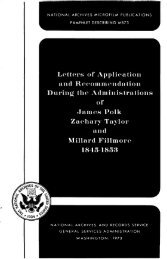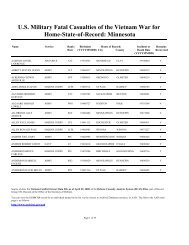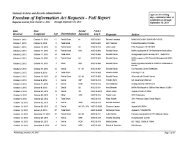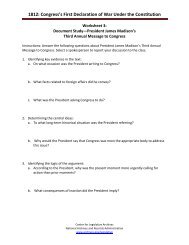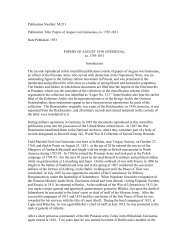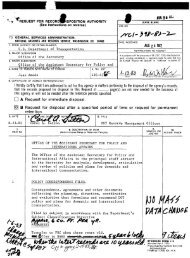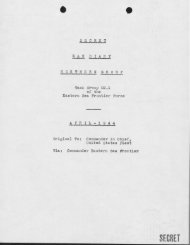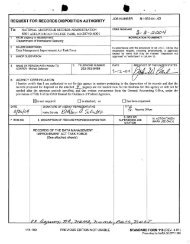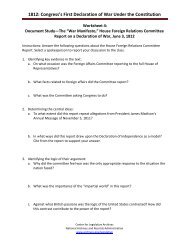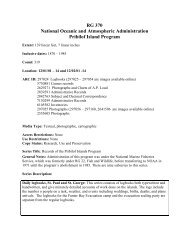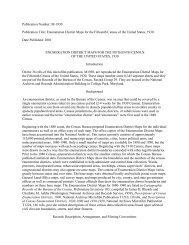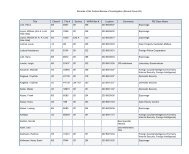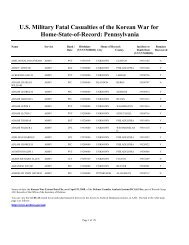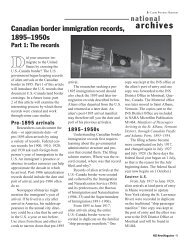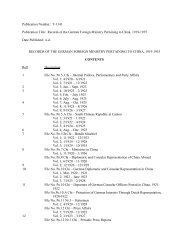HITLER'S SHADOW - National Archives and Records Administration
HITLER'S SHADOW - National Archives and Records Administration
HITLER'S SHADOW - National Archives and Records Administration
You also want an ePaper? Increase the reach of your titles
YUMPU automatically turns print PDFs into web optimized ePapers that Google loves.
might not be such a damn bad idea at that.” French intelligence officials, bitter<br />
at France’s loss of colonial territory in the Middle East, said they would enjoy<br />
having the Mufti around to embarrass the British. 22<br />
Husseini was well treated in Paris. Meanwhile, Palestinian Arab leaders <strong>and</strong> various<br />
Muslim extremists agitated to bring him back to the Middle East. According to the<br />
American military attaché in Cairo, this plan initially embarrassed moderate officials<br />
in the Arab League. But as prospects for a peaceful settlement in the British M<strong>and</strong>ate<br />
for Palestine declined <strong>and</strong> as other Arab prisoners were released or escaped (Gailani<br />
escaped), sentiment changed. A delegate of the Palestine Higher Arab Committee went<br />
to Paris in June 1946 <strong>and</strong> told Husseini to get ready for a little trip. 23<br />
According to another American source in Syria, at a meeting in the Egyptian<br />
Embassy in Paris, the ambassador, the ministers of Syria <strong>and</strong> Lebanon, <strong>and</strong> a<br />
few Arab leaders from Morocco <strong>and</strong> Algeria worked out the details of Husseini’s<br />
escape. The French government learned of, or was informed of, the plan, but<br />
chose not to intervene in order to avoid offending the Arabs of North Africa.<br />
Husseini flew to Syria, then went via Aleppo <strong>and</strong> Beirut to Alex<strong>and</strong>ria, Egypt. 24<br />
By 1947 Husseini denied that he had worked for the Axis powers during the<br />
war. He told one acquaintance that he hoped soon to have documentary evidence<br />
rebutting this sl<strong>and</strong>er, which the Jews were spreading. Similarly, after Adolf Eichmann<br />
was brought to Israel for trial in March 1961, Husseini, by now in Beirut, denied<br />
having ever met Eichmann during the war. He said that he had been forced to take<br />
refuge in Germany simply because British wanted to capture him. Nazi persecution<br />
of Jews had served Zionism, according to Husseini, by exciting world sympathy for<br />
them. Husseini never worked for American intelligence; the CIA simply considered<br />
him a person worth tracking. He died in Beirut in 1974. 25<br />
Wilhelm Beisner, Franz Rademacher, <strong>and</strong> Alois Brunner<br />
The CIA <strong>and</strong> the CIC both compiled files on the versatile <strong>and</strong> French-speaking<br />
Wilhelm Beisner, who dealt with Husseini during <strong>and</strong> after the war. It is possible<br />
to trace Beisner’s long intelligence career better than has been done before. His<br />
tracks after the war intersected with those of German Foreign Office deportation<br />
specialist Franz Rademacher, <strong>and</strong> Adolf Eichmann’s subordinate Alois Brunner.<br />
All three spent most of their postwar years in the Middle East.<br />
22 | Nazis <strong>and</strong> the Middle East



